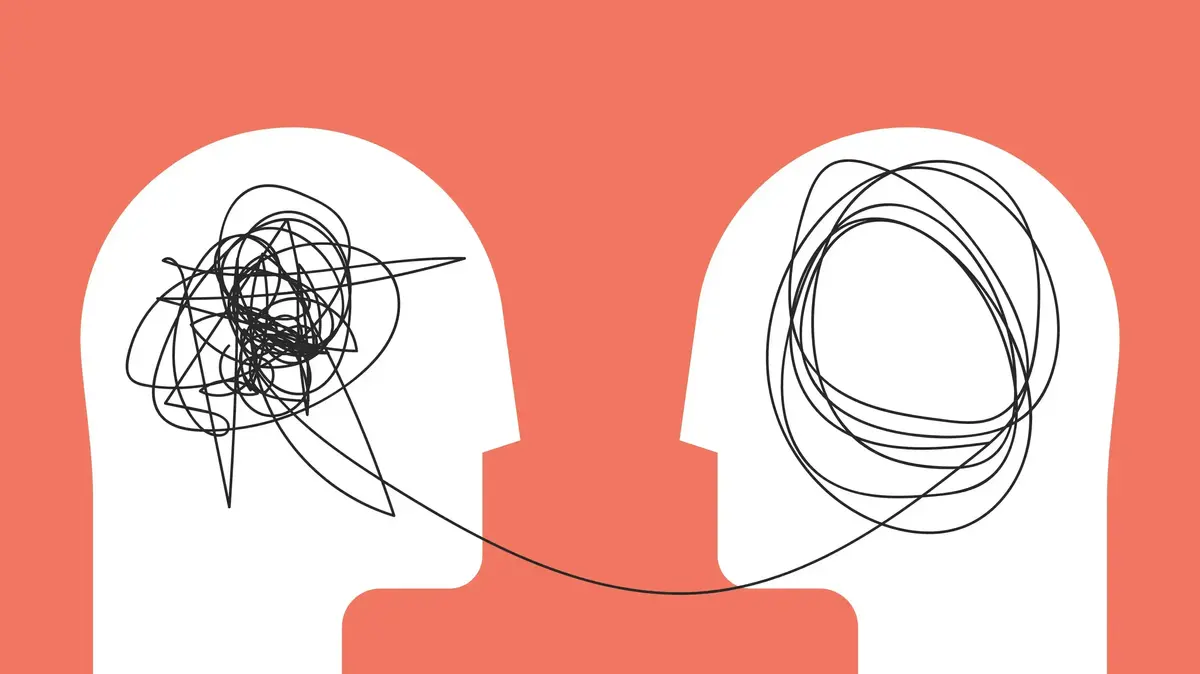Don't know how to say no?
You should read it
Anita Morjani has been teaching self-love healing for years, and now she is publishing a new book called "Sensitivity is the New Power" which should help empaths deal with the hypersensitivity we have.
Here is a look at a chapter from the new book
Voila system!
health
04/08/2022
Thursday, 04 August 2022, 07:35 Updated: 09:25
Share on Facebook
Share on WhatsApp
Share on Twitter
Share by email
Share in general
Comments
Comments
Not all empaths find it difficult to refuse another person, but this trait is quite common among us.
An illustration of empathy (Photo: ShutterStock)
Mantra:
"It's okay to love myself enough to say 'no'"
The meaning of opening up to the sublime within us is to honor the sublime within us.
This may be challenging.
If you're anything like me, I guess it's hard for you to say "no", even when you really don't want to do something.
Not all empaths find it difficult to refuse another person, but this trait is quite common among us, because we feel what the people around us feel and often feel the emotional needs of strangers more strongly than we feel our own.
Although the love of empaths to serve is a good thing, this is the place to ask ourselves if this service increases our life force energy or depletes it.
In other words, do you say "yes" out of a genuine desire to say "yes", or do you say "yes" because you feel that is how you are supposed to respond, to fulfill some obligation or role?
We empaths seem to feel that we are serving someone when we sacrifice our own needs, by saying "yes" when it would be better not to.
But our refusal to say "no" causes us to make excuses instead of being direct, or we find ourselves doing things we don't want to do, because we are unable to say "no".
The first option is not straight, and the second eventually drains us, and thus we remain drained, exhausted and in some cases even sick.
And that's why we also exhaust those around us, especially those who love us especially.
The more sensitive we are, the more likely we are to feel shame, guilt, and discomfort when we let others down.
And so, our motive to please others, as I have already said, is twofold: a need to alleviate the problems of others because we feel what they feel, along with a need to avoid the pain associated with the feeling of guilt, if we disappoint them or do not meet their expectations.
When a person subordinates his needs over extended periods of time to help others fulfill their needs, while those same people do not help him in return to fulfill his own needs, this can lead to feelings of resentment and repressed anger.
A joint study conducted in 2013 by the T. H. Chen School of Public Health at Harvard and the University of Rochester showed that people who stifled their emotions had a 30 percent increased risk of premature death from a variety of causes, and their chance of developing cancer was 70 percent greater. 1 percent.
If so, how do empaths behave in close relationships?
And what are the problematic pitfalls for those of us who are in a relationship?
A relationship can be difficult for both parties.
Empaths need a lot of alone time, we need our own physical space, and a quiet environment.
We can unwittingly sabotage relationships by becoming pushovers, compromising our boundaries, and subjecting ourselves to our partners.
We are also very giving and understanding, sensitive to the needs of others and supportive.
If we stay around a person who does not understand empaths and does not respect our needs, we may lose ourselves, or sacrifice those needs in an attempt to preserve the relationship - then we are in trouble.
If the person with us needs things that are very different from our basic needs - maybe he likes to be together around the clock, maybe she likes to socialize with other friends, maybe he likes background noise and maybe she likes to have a constant conversation - it can be difficult, for both parties.
Acknowledging these differences and respecting them can go a long way in creating healthy and enabling compromises.
We will want to stay away from relationships with people who care mostly about themselves.
Narcissists are especially attracted to us because we see the real person behind the mask they present to the world and want to love and care for that person.
And they desperately want the same unconditional love and care.
But the moment we upset them—disagree with them or find some fault, or something threatens their inflated but shaky sense of self—we can lose ourselves completely in trying to avoid their displeasure and the affection they might withhold from us.
When two empaths meet, the connection from the heart, the mutual understanding and the ability to feel what the other party feels can lead to a deep relationship of soulmate.
On the other hand, each of the spouses perceives the emotional and physical distress of the other party.
And there is not much room for secrets.
The other side always knows what you feel and what you don't say.
Relationships are a spiritual connection and both parties should treat them with love and understanding.
That is why it is especially important for empaths and their friends to express needs and preferences and find a way to respect both sides.
Communication, love and respect can be extremely significant in laying a strong foundation for a long-lasting relationship.
Fly away from guilt
The main reason why we subject ourselves to others is guilt.
Feeling guilty can be a common thing among empaths.
This is another reason why we have a hard time saying no.
One of the main reasons why I was unable to say no was the guilt I felt if I let someone down.
I didn't stop gauging what would be worse: doing something I didn't want to do or the guilt that would be my lot if I said "no".
For example, when I was in my early twenties and single, my friend Tanisha, a single mother of young children, was struggling to make ends meet while taking care of her two children, who were of elementary school age.
She really wanted to start dating again and didn't have time in her busy schedule to work and take care of the kids. I felt really sorry for her. Really! In my mind's eye, I put myself in her shoes—as empaths naturally do—and felt how hard it was to be her. That feeling wasn't I liked her, so I made it my goal to help her because I needed her to feel better.
However, over time, her condition did not improve and our arrangement was very convenient for her.
I, on the other hand, began to feel that I was taken for granted.
I felt that she saw me as a permanent solution to her problems.
I was a young woman myself, I too had needs and desires and slowly I began to feel that they were pushed aside, so that her needs would be met.
I could not complain to Tanisha, because empaths encounter this pattern often.
We attract people with all kinds of needs and make them feel so comfortable that they no longer have any incentive to change their situation.
More in Walla!
Have you been told that your child is "too sensitive"?
You should read it
To the full article
The cover of the book "Sensitivity is the new power" by Anita Morjani (photo: Keter Publishing)
We convince ourselves that this is how friends treat each other, even though deep down we know we wouldn't feel comfortable asking something like that from others, because of our difficulty in receiving.
The problem is that the longer such situations last, the harder it is for us to extricate ourselves from them, and this leads to more problematic consequences that could have been avoided or needed at a much earlier stage.
In Tanisha's case, my resentment grew and grew until we had a huge argument that was blown out of proportion to what started it.
But after things calmed down, I was the one who apologized for exploding like that, because the reason that started the argument did not justify the anger I expressed.
Not only was the original matter not resolved, now I also felt guilty for the anger and resentment I felt towards her.
Because of this I judged myself, beat myself up and believed that I was a bad company.
O-then I redoubled my efforts to try to be a good friend to her, which made me even more resentful of her for taking up all my time and all my attention.
this pattern
of exploding with resentment and then doubling down on guilt seems pretty standard in many situations in my life.
It is a common thing for empaths to find ourselves in such situations where we lose from all directions.
What a crazy way to live and waste energy.
Eventually the situation came to a head when I met my husband, Danny, and fell in love with him.
We went out and spent a lot of time together, and I noticed that Tanisha was not happy for me.
I was surprised.
I thought she would be overjoyed that I am with a man who makes me happy.
But I didn't have much time for her anymore, and she started nattering to Danny.
I found myself doing figure eights in the air trying to appease her.
And yet, I felt many times that she was putting me in a position where I was forced to choose between her and Danny, instead of simply accepting him into my life, the healthy thing to do.
I chose Danny of course and with a lot of pain, sorrow and guilt in my heart I turned my back on our friends.
Only in hindsight did I see this friendship as it is.
After a while, Tanisha came back into my life and even apologized, but only when she saw that I wasn't coming back and that I was really happy without her.
Looking back on my troubled friendship with Tanisha, and other similar events in my life, I realize that the tendency to avoid conflict actually leads to more conflict in the long run.
We avoid conflict because we fear it will deplete our strength.
But if we manage to stand up for ourselves without fear, and do it in the most generous way possible, it will be easier and we will be filled with a strong sense of self-love, which comes when we take care of ourselves.
If I had listened to my heart at a much earlier stage and said something, it would have been very painful, but I would have saved myself a lot of heartache later on.
"Sensitivity is the new power" by Anita Morjani, Keter Publishing
health
psychology
Tags
empathy
Hypersensitivity















